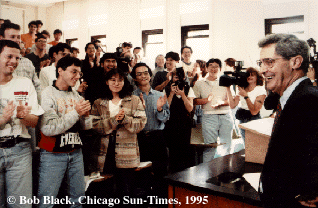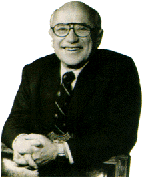Economics dynasty continues
Robert Lucas wins Nobel Prize Winner's circle: Lucas got a standing ovation from his students hours after the prize was announced.
Winner's circle: Lucas got a standing ovation from his students hours after the prize was announced.
Each year, University of California economist David Romer runs a pool for macroeconomists on who will win the Nobel Prize in Economic Science. Each year, a lion's share of the $1 bets were on Robert Lucas, AB'59, PhD'64.
Those bets paid off October 10 at 5:30 a.m. The cat had been fed, and Bob Lucas was just settling down to tackle the daily Times crossword when a call came from the Royal Swedish Academy of Sciences, telling him he'd won the prize and the $1 million that goes with it.
It's a call made with astounding frequency to Chicago faculty who delve into economics theory--five of the last six prizes awarded in that category went to professors at the U of C, where the joke has been that it's not so much an honor to win a Nobel as it is a disgrace not to. On October 10, a GSB cafeteria played up the humor with its blas offering of a free sandwich and Coke to everyone with a Nobel on their c.v., "one per customer...chips are extra."
In fact, the campus was bursting its limestone seams with pride. Tenured professors and department secretaries shared the news over cups of coffee that substituted for champagne, and then got back to work. By 10:30 a.m., Lucas was facing that Nobel rite of passage, the morning press conference, held in Swift Commons. On hand to offer applause and moral support, were three past prize winners: Gary Becker, AM'53, PhD'55; Robert Fogel; and Merton Miller. (Other economists who won the award while on Chicago's faculty are Milton Friedman, AM'33; Theodore Schultz; the late George Stigler, PhD'38; and Ronald Coase.)
Fogel, who won the Nobel in 1993, called Lucas's prize "long overdue." Becker, a 1992 winner, said that "no one since Milton Friedman has had so great an influence on the development of macroeconomics as Robert Lucas," adding that "his work was initially met with hostility, but it came to be accepted as the view of the future."
Becker himself knows a lot about having work met with hostility: His use of economic theory to examine social problems won him mostly ridicule at first. Lucas took a similar chance when, in the 1970s, he challenged a notion proffered by John Maynard Keynes and championed by most economists at the time: that government policy can be used to steer investment, raise output, or shrink unemployment by using such tools as taxes, government spending, and the amount of money in circulation.
In reaction to a recession, for example, a Keynesian might propose that policymakers pump more money into a flat economy by cutting taxes. The result would be inflationary, but it would also increase jobs and stimulate the economy. Lucas questioned this logic. Workers, he said, would eventually anticipate the negative effect that inflation would have on their paychecks and demand higher wages, while businesses would raise their prices. The end result: higher inflation, but no real economic growth.
"The implicit presumption in these Keynesian models," Lucas told reporters at his press conference, "was that people could be fooled over and over again. Our work was a direct challenge to the Keynesian orthodoxy of the day. It was intimidating, but it was fun. And we were right."
Challenging the orthodoxy of the day has been a trademark of Chicago economics that dates back at least to Milton Friedman. As a founder of the "Chicago school" of free-market economics, Friedman was an early opponent of Keynesian attempts to guide the economy. "But in fact," wrote Peter Passell in the October 11 New York Times, Friedman's "primary impact was to give the department a unique identity as the gadfly and permanent outsider, the place where free thinkers would not be cowed by convention."
Another distinctive trait of Chicago economics is its interdisciplinary quality. Fogel and Becker linked history and sociology, respectively, to their economics. Coase, a professor in the Law School, won the 1991 Nobel for applying economic principles to the study of law.
And it could also be that greatness inspires greatness. Many early Nobelists (the economics prize was first awarded in 1969) mentored later
The New York Times wryly speculated whether there is something in Chicago's water to account for its many Nobels.

He started it: Milton Friedman began the Nobel string in 1976.
winners. Both Becker and Lucas, for example, took classes from Friedman.
 The University of Chicago Magazine December 1995
The University of Chicago Magazine December 1995